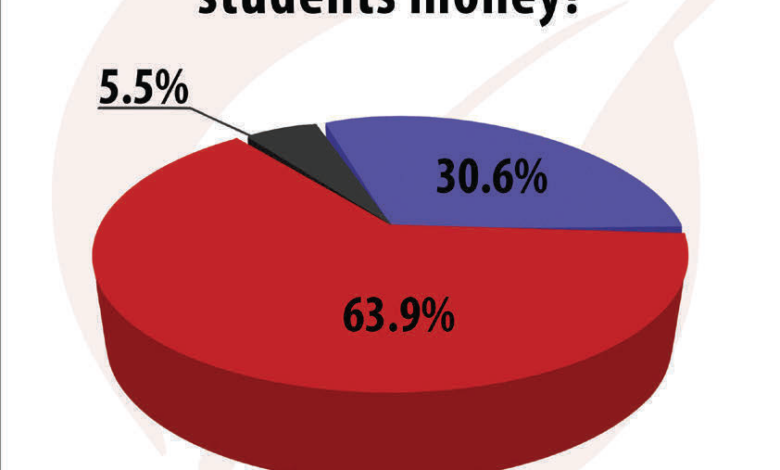
New First Day program questioned by student body
WHEN Rider students opened their university bill for the upcoming fall semester, they were met with a new, mysterious fee for something called “First Day Complete,” a program that every student was automatically opted in to by the university.
First Day was pitched as a simple, almost charitable way for scholars to source course materials, but the student body was quick to realize why the administration adopted First Day in a time of dire financial need.
“We did not like this program, and we did not think it would be beneficial for the student body,” said Rider’s Student Government Association (SGA) President Naa’san Carr to The Rider News. “We actually told the administration no, and it was to our surprise … that the institution was going forward with this program.”
First Day charges students $23 per credit in exchange for discounted and convenient access to rented course materials, meaning students taking a typical 15-credit schedule would be charged $345 per semester on average.
In an email sent out on June 27, Rider claimed students will save approximately 35-50% on course material, while avoiding the hassle of shopping around and worrying about books arriving before classes start. Enrolled students were given access to digital materials on the first day of classes, and physical copies were available for pickup at the Rider University Bookstore.
The program was implemented through Barnes & Noble College, the manager of Rider’s bookstore, who now has hundreds of colleges participating nationwide, including nearby Rutgers University.
All undergraduate students were enrolled in the program when it was introduced, regardless of whether or not it benefited them.
On Aug. 7, the first day of the program’s opt-out period, SGA sent out a universitywide email informing the student body, along with a link to the opt-out page.
“We just want to make the student body aware that they have an option,” said Carr. “We’ve been finding other ways to get our textbooks: buying from a bookstore, buying from other resources, renting them at a cheaper rate than buying them at Rider University.”
According to Carr, when SGA sent out the Aug. 7 email, the opt-out page on Barnes & Noble College’s website crashed because so many students were withdrawing at once.
“I think there’s really something there that’s valuable,” said Carr. “This was a missed opportunity for the administration to reach out to students and see what was of value to them, because students are the heart of the university. … They weren’t engaged with the student body and it shows.”
During the staff and faculty convocation on Aug. 31, Rider President Gregory Dell’Omo had the program listed as one of many “revenue enhancements,” alongside things like the new student parking fee and Mercer County Community College housing program.
According to Dell’Omo, First Day is expected to bring in approximately $150,000 in revenue during the 2024 fiscal year.
“First Day allows students to get all of their course materials electronically through Barnes & Noble, which obviously increases the commissions for the university,” said Dell’Omo during the convocation. “This will also provide a convenience and a fair market value for the students.”
From Aug. 31 to Sept. 3, The Rider News conducted a survey that gauged the usefulness and standing of First Day among Rider’s student body.
Of 36 participants, 28 (77.8%) said they had already opted out of First Day. They were also asked if the program was benefiting them, with 23 students saying they were not saving money, 11 saying they were unsure and two saying they were.
Notably, there was an overlap in the data between students who are still enrolled in First Day, and students who don’t know how it is affecting them financially.
Participants were then asked to provide any thoughts they had on First Day; a few students said they were saving anywhere between $200-300 on course materials, but the majority expressed negativity or apprehension toward the program.
“I think First Day is a scam,” said sophomore voice performance major Jacqueline Burkholder in the survey. “Rider is so desperate to wring us for every drop we have and this just seems like another one of those things, kind of like the new parking fees. I have been able to procure all of my textbooks for less than $50.”
Barnes & Noble College claims that 79% of students believe First Day offered them more affordable course materials, and that 83% felt more prepared for their academic term.
“I was being charged $368 for print and digital rental books through the program,” said sophomore arts and entertainment industries major Emma Zatkowski in the survey. “After opting out, I bought print copies of all my textbooks and rented one from the campus bookstore. The total was about $150. Where was the extra $200 they were charging me going?”
The dissonance between First Day’s message and student experience was documented in a study published in February 2020 by professors and librarians at the College of William & Mary that examined the affordability of course materials. The report includes an evaluation of First Day that found the program was not a viable option.
“We found no firm documentation of savings that might be realized,” the study claimed. “The program was viewed as merely shifting costs from students taking courses with high-cost materials to students in courses with lower-cost materials. As a result, for example, English majors would subsidize books for business or STEM majors.”
Students enrolled in First Day also receive additional discounts at the Rider Bookstore: 20% off school supplies, 10% off electronics (excluding laptops) and 10% off calculators, according to the bookstore.
The deadline to opt out of First Day is Sept. 19.


